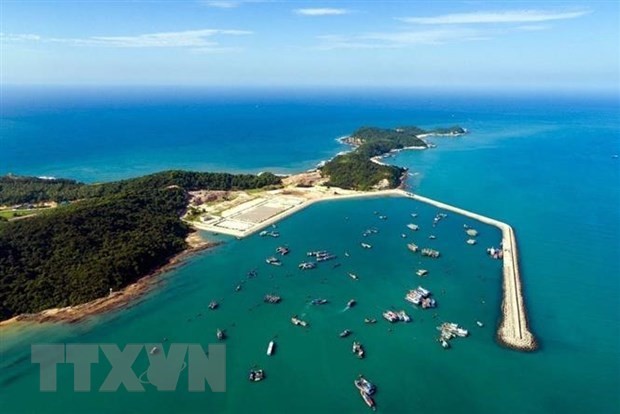
Quang Ninh: Tourists discouraged from bringing single-use plastics to Co To Island
Latest
 |
| An islet in Co To Island district of Quang Ninh province. (Photo: VNA) |
The move will be piloted from three to six months before local authorities consider the official imposition of a ban on plastic use in efforts to boost sustainable tourism development.
After the shutdown triggered by the COVID-19 pandemic, Co To has been busy welcoming visitors back, but this also means an increase in the amount of plastic bags and bottles used by travellers as well as tourism establishments.
On July 21, the Secretary of the district Party Committee and Chairperson of the district People’s Committee issued the decision at a conference that discussed measures to improve the tourism business environment and quality.
One of the focal tasks is to step up communications to raise businesses, local residents and travellers’ awareness of environmental protection and encourage the use of products made from recycled and environmentally friendly materials.
To effectively enforce this regulation, local authorities have asked transportation and travel companies to give guidance so that tourists will not bring plastic and polluting items to Co To.
The district is also calling on local residents to actively join hands in preventing plastic waste by saying no to single-use plastic products, using those made from eco-friendly materials, and engaging in environmentally-friendly practice at home.
Vice Chairman of the district People’s Committee Do Huy Thong said apart from daily waste and marine debris, garbage discharged from tourism activities is also a burden on the local environment.
He noted Co To welcomes up to 6,000 - 8,000 visitors on peak days, and if each of them uses or brings one or two plastic bags or bottles, it would be full of plastic waste. It takes not just several days or years but thousands of years for plastic waste to decompose. With the current tourism growth, immediate solutions must be taken or the district may become an “island of waste”.
Given this, Co To is discouraging visitors from bringing single-use plastic items to the island, Thong went on, adding a small effort by tourists can help keep the environment clean and minimise waste discharged into the ocean.
The district hopes the policy will receive support from locals and tourists, the official said.
Located north-east of Quang Ninh, Co To Island boasts huge potential for maritime tourism. The number of domestic and foreign visitors has been on the rise over the years.
Co To’s move to reduce plastic use is also part of Quang Ninh’s efforts in this regard.
Authorities in the province recently approved a proposal to continue a zero-plastic-waste programme on Ha Long Bay, a UNESCO-recognised world natural heritage site.
Accordingly, organisations and individuals working in tourism and services in the bay commit not to use or buy and sell single-use plastic products, and replace them with environmentally friendly ones.
Communications will also be strengthened to persuade tourists not to bring or use single-use plastics during their cruises around Ha Long Bay. Ship owners are advised to refuse providing services in case their customers intentionally do not comply with this regulation.
An estimate in 2020 by the Ending Plastic Pollution Innovation Challenge (EPPIC) project showed that among over the 28,280 tonnes of plastic waste released in the bay area each year, about 5,272 could be discharged to the sea, and 34 tonnes of waste came from tourism activities every day.
Patrick Haverman, Deputy Resident Representative of the UN Development Programme (UNDP) in Vietnam, said plastics account for an estimated 70 - 80% of marine debris. While many countries have made considerable efforts to fight plastic waste, challenges caused by marine plastics are transboundary.

















